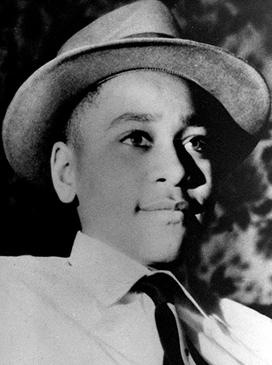Links from 2/17 -- Civil Rights Era, Baseball, & the Century Cycle
 While I'm online this evening, I'd like to send you links to the clips we watched in class this evening.
While I'm online this evening, I'd like to send you links to the clips we watched in class this evening.
Above is a picture of Emmett Till, the boy who was lynched in Mississippi in 1955, just two years before Fences takes place.
First are the clips from Eyes on the Prize, a documentary from 1987, two years after Fences was first performed.
I want to add the clip about Emmett Till:
Below is a documentary on the events in South Boston that I had mentioned:
Above is a picture of Jackie Robinson sliding home. He was also an exciting baseball player. Below is a picture of Satchel Paige.

These are the clips about baseball. First, Buck O'Neil recalls a Negro League World Series game in which legends Satchel Paige and Josh Gibson clashed.
Here Buck O'Neil remembers Jackie Robinson being signed to the major leagues:
The link to the documentary on Jackie Robinson is below:
More recently, the film 42 retold Robinson's life for 2013:
Ah ha! I finally found a number. Kenny Leon has directed *five* different versions of Fences as well as versions of all but one play in the Century Cycle.

Let's take a look at scenes from the other plays. Set in the 1900s, the first play in the cycle is the magical Gem of the Ocean.
Here is a link to Kenny Leon in rehearsal at his TrueColors Theater in Atlanta:
You may see clips from Bartlett Sher's production of the next play, Joe Turner's Come and Gone, which was set in the 1910s.
The set from this production at Lincoln Center is incredibly different from the set of DC's African Continuum Theater, which I saw.
Wilson's 1920s play is Ma Rainey's Black Bottom, the only play *not* set in Pittsburgh:
The Piano Lesson takes place in the 1930s.
Seven Guitars is set in the 1940s.
Fences is Wilson's 1950's play.
See the links below for Two Trains Running, the 1960's play, and an interview with one of its directors.
Jitney, Wilson's 1970's play, was actually written first. Gem of the Ocean and Radio Golf were the last.
I saw the version profiled in this video!!
I had a difficult time finding a clip of King Hedley II, Wilson's 1980s play.
We'll finish with Radio Golf, the last play that Wilson wrote.
Israel Hicks discusses the challenges of presenting Radio Golf. He has directed all ten of the cycle plays.
For more information about Wilson's Pittsburgh, see this clip:
Below is an undated photograph of Wilson's childhood home.


No comments:
Post a Comment